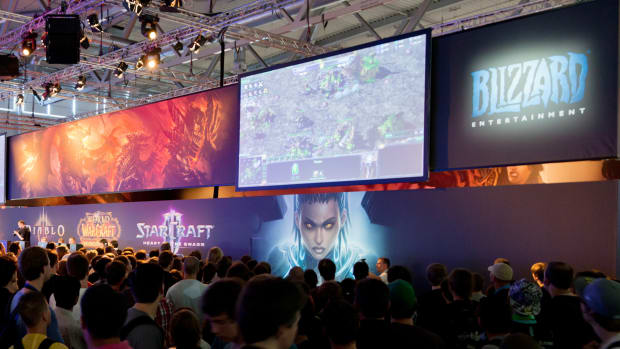Once one of the game industry's most beloved publishers, Activision Blizzard (ATVI) has fallen from grace in a major way over the last year--and it just keeps on tumbling.
Its latest bit of bad press comes from two new lawsuits. The first was filed in California on Thursday by shareholder Kyle Watson in reaction to its upcoming sale to Microsoft (MSFT) and a second was filed (uploaded by Polygon) by shareholder Shiva Stein on Feb. 25.

Shutterstock
What Are the Activision Blizzard Lawsuits About?
Watson's lawsuit (also uploaded by Polygon) makes some claims that will sound awfully familiar to anyone keeping up with Activision Blizzard's issues over the last year: Accusing that the board is seeking to “procure for themselves and senior management [...] significant and immediate benefits" and calling the future sale "unfair for a number of reasons."
The document also points out that the Feb. 18 SEC filing violates the Exchange Act, saying that Blizzard failed to provide the necessary information/provided misinformation to its stockholders in regards to the sale to Microsoft.
Neither shareholder has made a request for Activision Blizzard, owner of the popular Call of Duty franchise, to terminate the transaction, although Watson's lawsuit requests a new SEC preliminary proxy statement from Activision Blizzard with "no untrue statements" and more factual information, as well as "rescissory damages."
Stein's lawsuit, filed in New York, makes similar claims, saying "the (SEC) Proxy Statement misrepresents and/or omits material information that is necessary for the Company's stockholders to make an informed decision."
What's This Mean for Activision Blizzard?
These lawsuits are the latest in a stack on CEO Bobby Kotick's desk, and they may not seem like much compared to the ones closer to the bottom.
The firestorm surrounding Activision Blizzard started in July 2020 when the California Department of Fair Employment and Housing filed a lawsuit against the publisher, alleging that its "frat boy" culture.
The lawsuit elicited an explosive reaction from employees and non-employees alike. Employees participated in strikes and unionization efforts. But then another bomb dropped: A report from The Wall Street Journal highlighting evidence that Kotick had known about the sexual harassment at the company for years and did nothing about it.
As the company's publish reputation continued to tarnish, Activision Blizzard's stock plummeted to record lows and shareholders called for Kotick's resignation. But so far, Kotick is still leading the company.

Michael Kovac/Getty Images for Vanity Fair
Why Hasn't Kotick Been Fired?
As much as a complete company overhaul may seem like the solution to these issues, the heart of the matter is much more complicated.
Firstly, firing Kotick will cost the company a lot of money. A proxy statement issued to the SEC in June 2021 gives exact numbers: $264,524 for Termination for cause, and $265,175,849 for Termination without cause.
Also, the SEC is currently conducting an investigation into Activision Blizzard, which widened in scope as of Feb. 18. While this process takes time, the deeper dive does not spell out good things for Kotick's future with the company.
Why These Lawsuits Matter
Many have called the Activision Blizzard debacle a #MeToo moment for the video game industry. It highlights a crucial problem: the gaming industry's history of sexism runs deep in its veins, and removing Kotick won't uproot that.
From its numerous issues with sexual harassment claims at high profile companies such as Ubisoft and Riot Games to its history of demeaning women by paying them less than their male coworkers, it's clear that those affected are no longer willing to stay silent. These new lawsuits are yet another example of that.
High-profile men in the industry are seeking change as well, and Microsoft Gaming CEO Phil Spencer is one of them. He's publicly stated his disapproval with Activision Blizzard's behavior, and Microsoft will be in the ideal position to clean house when the sale goes through in 2023.
That said, Microsoft has had its own brush with sexual harassment claims. Its shareholders voted in favor of a harassment report in November 2021, but it does cast Microsoft's credibility in a shadowy light.
The industry needs more outspoken voices from its current ranks, as well as bringing in more diverse leaders to create the work environment they've long deserved. And while tearing down a long standing patriarchal structure is always a slow process, it will continue, one brick at a time.







